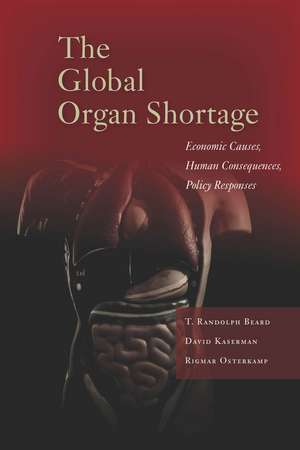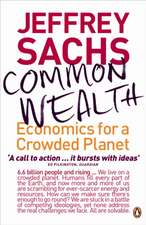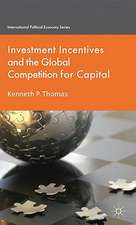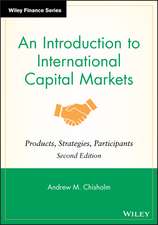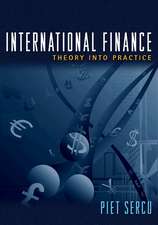The Global Organ Shortage: Economic Causes, Human Consequences, Policy Responses
Autor T. Beard, David Kaserman, Rigmar Osterkampen Limba Engleză Hardback – 8 ian 2013
Although organ transplants provide the best, and often the only, effective therapy for many otherwise fatal conditions, the great benefits of transplantation go largely unrealized because of failures in the organ acquisition process. In the United States, for instance, more than 10,000 people die every year either awaiting transplantation, or as a result of deteriorating health exacerbated by the shortage of organs.
Issues pertaining to organ donation and transplantation represent, perhaps, the most complex and morally controversial medical dilemmas aside from abortion and euthanasia. However, these quandaries are not unsolvable. This book proposes compensating organ donors within a publicly controlled monopsony. This proposal is quite similar to current practice in Spain, where compensation for cadaveric donation now occurs "in secret," as this text reveals.
To build their recommendations, the authors provide a medical history of transplantation, a history of the development of national laws and waiting lists, a careful examination of the social costs and benefits of transplantation, a discussion of the causes of organ shortages, an evaluation of "partial" reforms tried or proposed, an extensive ethical evaluation of the current system and its competitors.
Issues pertaining to organ donation and transplantation represent, perhaps, the most complex and morally controversial medical dilemmas aside from abortion and euthanasia. However, these quandaries are not unsolvable. This book proposes compensating organ donors within a publicly controlled monopsony. This proposal is quite similar to current practice in Spain, where compensation for cadaveric donation now occurs "in secret," as this text reveals.
To build their recommendations, the authors provide a medical history of transplantation, a history of the development of national laws and waiting lists, a careful examination of the social costs and benefits of transplantation, a discussion of the causes of organ shortages, an evaluation of "partial" reforms tried or proposed, an extensive ethical evaluation of the current system and its competitors.
Preț: 445.70 lei
Preț vechi: 550.25 lei
-19% Nou
Puncte Express: 669
Preț estimativ în valută:
85.29€ • 91.20$ • 71.11£
85.29€ • 91.20$ • 71.11£
Carte tipărită la comandă
Livrare economică 17 aprilie-01 mai
Preluare comenzi: 021 569.72.76
Specificații
ISBN-13: 9780804784092
ISBN-10: 0804784094
Pagini: 264
Dimensiuni: 152 x 229 x 20 mm
Greutate: 0.45 kg
Editura: Stanford University Press
Colecția Stanford Economics and Finance
ISBN-10: 0804784094
Pagini: 264
Dimensiuni: 152 x 229 x 20 mm
Greutate: 0.45 kg
Editura: Stanford University Press
Colecția Stanford Economics and Finance
Recenzii
"[The authors] build an interesting model distinguishing between deceased-donor and living-donor kidneys . . . and generate comparative-static predictions . . . Overall, this book constitutes a courageous and well-researched attempt at coming to grips with a major problem in the current organization of health care that is becoming more critical and global by the day."—Peter Zweifel, Public Choice
"A growing number of transplant professionals, ethicists, and economists recognize the potential for incentives to improve access to transplants, but rarely has the argument for incentives been put forward with so much clarity, logic, and in-depth knowledge of transplantation."—David Howard, Emory University
"In most countries, the channels for organ procurement impose intolerable burdens on ill patients. This book examines the organ shortage from many different angles in search of resolution. Big problems generally require market-based solutions, and the authors show that this issue is no exception to that rule. Their proposal for a compensated system of organ procurement deserves to be widely read and debated."—Julio Jorge Elias, Universidad del CEMA, Argentina
Notă biografică
T. Randolph "Randy" Beard is Professor of Economics at Auburn University. Rigmar Osterkamp is Fellow at the School for Political Studies at University of Munich. The late David L. Kaserman was Torchmark Professor of Economics at Auburn University.
Descriere
This is the first book to provide a global examination of the shortage of organs for transplantation from an economic perspective. It provides a detailed proposal for reform based on the availability of compensation for donations within a publicly controlled monopsony.
